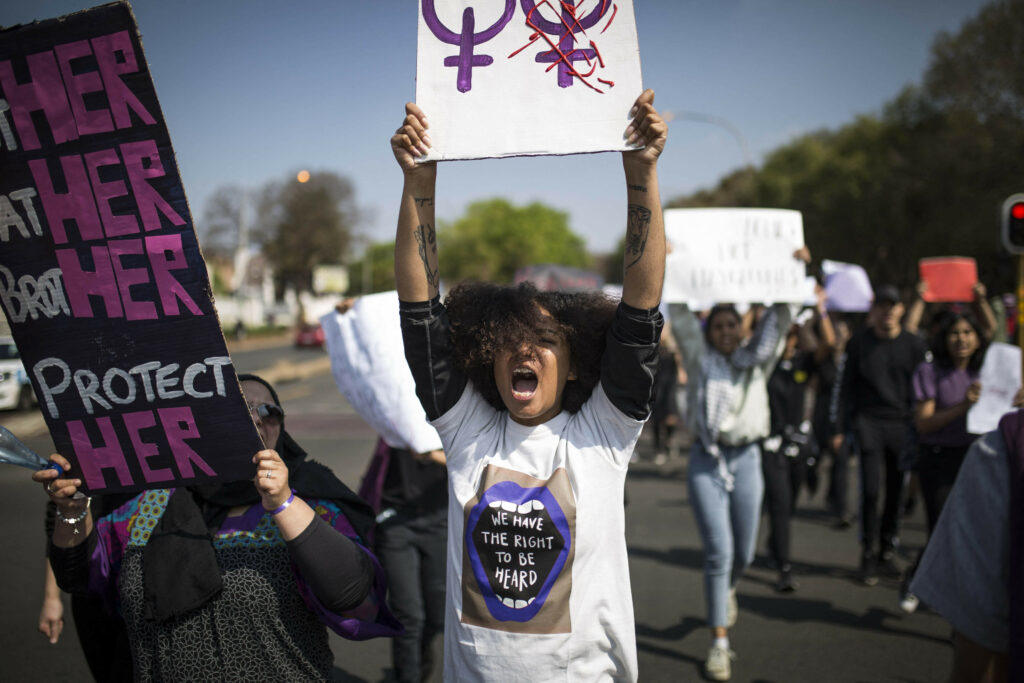Hateful: Jacob Zuma’s supporters wait outside court during his rape trial.
‘South African men hate women” is a phrase often used on social media.
It is used by women lamenting the high incidence of gender-based violence that occurs in our country on a daily basis. Statistics South Africa estimates that one in five women have experienced physical violence at the hands of their partners.
I recognise the deep-seated misogyny in our country that underlies the statement. Misogyny — a dislike of, contempt for or ingrained prejudice against women — is a strong form of sexism and it has the potential to be violent.
In March this year, the police in England and Wales announced that they would experiment with recording incidents of misogyny as a hate crime after the murder of Susan Everard and in response to men’s violence towards women in the United Kingdom.
Everard disappeared on 3 March after leaving a friend’s house in London and her body was found about two weeks later in southern England. The man charged with her kidnap and murder was a police officer.
In 2019, journalist Karima Brown won a court case against the Economic Freedom Fighters for their threats of rape and death after she mistakenly shared an editorial brief to the EFF’s WhatsApp group.
EFF leader Julius Malema retaliated by publishing her cellphone number on his Twitter feed, which had more than two million followers at the time.
Brown received hundreds of horrific messages. She fought back and won.
Nevertheless, men still use these tactics against women.
We saw numerous examples of misogyny when Donald Trump was president of the United States and more recently when British broadcaster Piers Morgan publicly and viciously denigrated Meghan Markle, the Duchess of Sussex, and then tennis champion Naomi Osaka for speaking their minds against powerful institutions.
Just last week, when Acting Chief Justice Sisi Khampepe delivered the majority judgment against former president Jacob Zuma, her words were dismissed by his foundation as being “emotional and angry”.
Zuma, on Sunday in outlining his reasons why he would not go to jail, referred to a conspiracy theory involving that “beautiful little girl”, a reference to the former public protector, Thuli Madonsela.
There were fears that violence would follow the words. Violence starts with thoughts and words. It starts with the notion that girls are inferior to boys, that they are there to serve boys, to please them, and that they can be treated in these demeaning ways.
 People protest against the abuse of women after the murder of Uyinene Mrwetyana, 19. (Photo by Guillem SARTORIO / AFP)
People protest against the abuse of women after the murder of Uyinene Mrwetyana, 19. (Photo by Guillem SARTORIO / AFP)
In an interview with The New York Times, Laura Bates, author of Men Who Hate Women: From Incels to Pickup Artists — The Truth about Extreme Misogyny and How it Af fects Us All, said: “We’re not joining the dots, nobody is making connections. There is a big picture here that we are just repeatedly missing. There are connections between the normalised daily behaviours that we brush off and the more serious abuses.”
In 2012 she created the Everyday Sexism Project to highlight the instances of harassment women have to deal with on a daily basis, often considered not significant enough to report.
But misogyny and patriarchy are deeply entrenched in the very institutions that should be safeguarding and enhancing women’s rights and their agency. It is well known that institutions such as the police are not victim-centric, especially in instances of rape and domestic violence where the victim is almost always a woman.
Some religious institutions have turned from being havens of safety and refuge into places where the leaders have perpetrated heinous acts against women.
Schools have been called out continuously over the years for the perpetuation of sexist jokes, words and songs, all of which create a culture where it is considered okay to denigrate girls and women.
In 2019, boys from St Kevin’s College in Melbourne, Australia, were caught on camera reciting an offensive chant on public transport while on their way to an inter-schools athletics meet.
 The Jacob Zuma Foundation accused Acting Chief Justice Sisi Khampepe after she sentenced Zuma. (Sydney Seshibedi/Gallo Images)
The Jacob Zuma Foundation accused Acting Chief Justice Sisi Khampepe after she sentenced Zuma. (Sydney Seshibedi/Gallo Images)
According to the Australian Broadcasting Corporation, the woman who filmed the footage said the chant was “disgusting” and showed “no respect for women”.
She also said, most tellingly: “You felt that you couldn’t say anything and if you did, I think you’d be really concerned about what might happen next.”
The family is an institution where acts of misogyny must be called out and spoken against. It is in their homes that boys must be taught from a tender age that women are just as capable and respectable as men are.
The failure of these institutions to speak out against any and all forms of misogyny is highly problematic. Silence in the face of any form of prejudice creates the illusion that it is fine for people to treat others with contempt. This is not and will never be the case.
Misogyny is the breeding ground for the perpetuation of hate crimes against women. As a result, the state and its institutions need to dismantle all the obstacles that enable men to hate women.
Many of us know the phrase, “the love of money is the root of all evil”. Well, I say that in South Africa, the hate of women is a root cause of gender-based violence and femicide.
Women in South Africa find themselves faced with myriad problems ranging from unemployment to being disproportionately affected by the Covid-19 pandemic.
We should stop misogyny from being one of these challenges. Women have enough to deal with. In a society that claims to be progressive, the line that South African men hate women is an indictment.